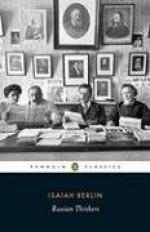
|
| Name: _________________________ | Period: ___________________ |
This test consists of 15 multiple choice questions and 5 short answer questions.
Multiple Choice Questions
1. Which thinker saw progress in the growth of national cultures?
(a) Hegel.
(b) Herder.
(c) Mazzini.
(d) Mickiewicz.
2. What does Berlin say is underestimated in Tolstoy's legacy?
(a) His acute social commentary.
(b) His detailed descriptions.
(c) His philosophy of history.
(d) His moral vision.
3. What was Hegel's appeal to Russian students?
(a) His world spirit seemed to prophesy the Russian Revolution.
(b) His idealism seemed like an escape from the squalor of Russia.
(c) His quasi-religious philosophy gave atheistic students something they could believe in.
(d) His theory of history seemed to predict Russian nationalism.
4. Who wrote the memoir titled "The Birth of the Russian Intelligentsia"?
(a) Pavel Annenkov.
(b) Alexander Herzen.
(c) Vissarion Belinksy.
(d) Ivan Turgenev.
5. Whose work did Bakunin expound paragraph by paragraph?
(a) Hegel's.
(b) Schelling's.
(c) Dostoevsky's.
(d) Herzen's.
6. What popular idea did Herzen disagree with?
(a) Herzen disagreed with the notion of individual freedom.
(b) Herzen disagreed with the notion of a pattern in historical events.
(c) Herzen disagreed with the notion that peasants deserve representation in government.
(d) Herzen disagreed with the notion of state power as a justification for violence.
7. How did Herzen see human society?
(a) Herzen saw human society as a spiritual reality in itself.
(b) Herzen saw human society as a number of connected--or disconnected--individuals.
(c) Herzen saw human society as the victim of industrial expansion.
(d) Herzen saw human society as the sum total of each individual's experiences.
8. What value did Herzen and Bakunin share?
(a) State power.
(b) Individual liberty.
(c) Church power.
(d) Spiritual experience.
9. What was Turgenev's "negative Hegelianism?"
(a) Turgenev saw Hegel's world spirit in the failure of reform movements in Russia.
(b) Turgenev rejected a world soul, but embraced the critique of materialism.
(c) Turgenev saw evolution as an inverse fulfillment of the Hegelian world-spirit.
(d) Turgenev rejected materialism as the basis for political developments.
10. How did Herzen see history?
(a) Herzen saw history as a mechanistic development.
(b) Herzen saw history as a movement of spiritual forces.
(c) Herzen saw history as the mind of God thinking.
(d) Herzen saw history as the narrative imposed after events.
11. Who was the Tsar following the Decembrist rebellion?
(a) Charles.
(b) Nicholas II.
(c) Nicholas I.
(d) Herzen.
12. How was the period that followed the Tsar's acts known?
(a) A period of tolerance.
(b) A period of prosperity.
(c) A period of repression.
(d) A period of terror.
13. What had been the outcome of the European states' revolution?
(a) Napoleonic wars.
(b) The Thirty-Years' War.
(c) A new era of peace.
(d) The revolution failed.
14. What did Tolstoy believe was the only way to access truth and reason?
(a) Human experience.
(b) Historical awareness.
(c) Transcendental experience.
(d) Spiritual transcendence.
15. What as Alexander Herzen's employment?
(a) He was an effective publicist.
(b) He was an education minister.
(c) He was a famous playwright.
(d) He was a censor in the government.
Short Answer Questions
1. Where did the term "intelligentsia" come from?
2. Which of the following describes Russian censorship during the middle of the nineteenth century?
3. What is the stereotype of the Russian intellectual?
4. How did the epoch that followed the Tsar's acts in the wake of the Decembrist Rebellions end?
5. What events proved the limitation Tolstoy described?
|
This section contains 585 words (approx. 2 pages at 300 words per page) |

|




